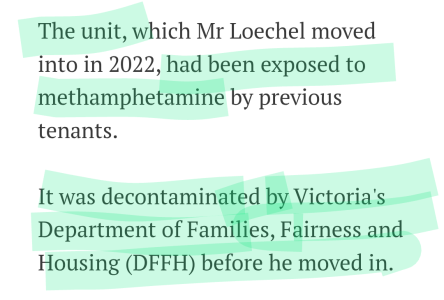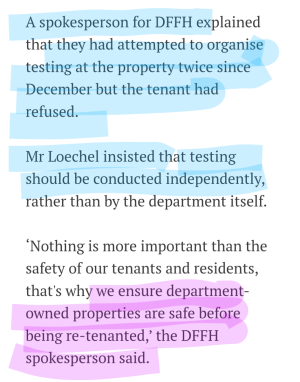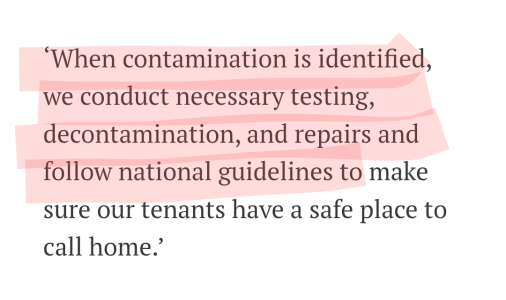Is your home making you sick? One tenant’s terrifying discovery will shock you!
By
Maan
- Replies 17
Living in a new home should be a fresh start, but for one tenant, what seemed like a fortunate move quickly turned into a nightmare.
Health concerns have sparked an unsettling investigation into what might be lurking behind the walls of public housing.
As more questions arise, the consequences of this discovery could have far-reaching implications.
Craig Loechel felt fortunate when he was offered a public housing unit in Wodonga after years of struggling to find an affordable home.
However, his health began to deteriorate shortly after moving in.
‘I started with really itchy eyes that I could barely open at night time on the way to the toilet, now I am in horrendous amounts of pain,’ he said.
‘I have trouble breathing, I have pain in my sides, my skin is a funny colour.’
‘I tried to get results from a doctor but can't get any answers.’
The unit, which Mr Loechel moved into in 2022, had been exposed to methamphetamine by previous tenants.
It was decontaminated by Victoria's Department of Families, Fairness and Housing (DFFH) before he moved in.
Mr Loechel began testing his home for methamphetamine in December 2024, using self-test kits in search of answers.
His tests showed positive results for traces of methamphetamine in his home.
‘It's quite actually overwhelming to have that confirmation in you know something's wrong, you know something's making you sick, you just don't know what it is,’ he said.
‘Then to see that line come up, it almost comes up in slow motion and it all hits, the emotion.’
He was waiting on further results from a private company that he had paid for to test his home.
Despite the positive test results and ongoing symptoms, Mr Loechel said he was devastated to remain in the property.
‘I would expect something like that they [the department] would want to move someone as quick as possible as it's a health concern,’ he said.
A spokesperson for DFFH explained that they had attempted to organise testing at the property twice since December but the tenant had refused.
Mr Loechel insisted that testing should be conducted independently, rather than by the department itself.
‘Nothing is more important than the safety of our tenants and residents, that's why we ensure department-owned properties are safe before being re-tenanted,’ the DFFH spokesperson said.
‘When contamination is identified, we conduct necessary testing, decontamination, and repairs and follow national guidelines to make sure our tenants have a safe place to call home.’
Recent research from Flinders University shed light on how methamphetamine can linger in homes and vehicles long after it has been consumed, cooked, or transported.
Jackie Wright, an adjunct researcher at Flinders University, highlighted that porous materials like gyprock and fabrics were particularly vulnerable to contamination.
‘We have also found through our research that it also goes in and out of the air,’ she said.
‘You don't have to touch the surfaces to get exposed to the methamphetamine, but just breathing inside the house means you are being exposed.’
Chronic exposure to methamphetamine, also known as third-hand exposure, doesn’t have the same euphoric effects as it does on first-hand users but is linked to concerning health issues.
‘We are seeing things like cognitive problems and behavioural problems in children, sleep issues, respiratory problems, skin issues, and also headaches,’ Dr Wright said.
While homes and vehicles contaminated with meth can be cleaned using chemicals, some materials, like fabric, can be difficult to decontaminate.
Surfaces with high levels of methamphetamine contamination may require removal rather than cleaning.
Dr Wright recommended that anyone with concerns about methamphetamine contamination in their homes or cars use a self-test.
If the results are positive, she advised contacting an independent company to conduct further testing to assess the contamination level.
‘It's really important to understand is it a little or is it a lot that's present, because that determines how easy it is to clean it up and also what level of risk it might pose to your health,’ she said.
As more tenants like Craig Loechel face alarming health issues linked to their homes, the demand for urgent testing of methamphetamine-contaminated properties has surged.
The rising trend highlights a growing concern for public housing tenants and their safety.
In a previous story, we explored how a tenant’s shocking health symptoms led to a troubling discovery about the contamination of his new home.
You can read more about it here.

With the growing concerns around third-hand methamphetamine exposure, what should be done to ensure tenants’ safety? Share your thoughts in the comments below.
Health concerns have sparked an unsettling investigation into what might be lurking behind the walls of public housing.
As more questions arise, the consequences of this discovery could have far-reaching implications.
Craig Loechel felt fortunate when he was offered a public housing unit in Wodonga after years of struggling to find an affordable home.
However, his health began to deteriorate shortly after moving in.
‘I started with really itchy eyes that I could barely open at night time on the way to the toilet, now I am in horrendous amounts of pain,’ he said.
‘I have trouble breathing, I have pain in my sides, my skin is a funny colour.’
‘I tried to get results from a doctor but can't get any answers.’
The unit, which Mr Loechel moved into in 2022, had been exposed to methamphetamine by previous tenants.
It was decontaminated by Victoria's Department of Families, Fairness and Housing (DFFH) before he moved in.
Mr Loechel began testing his home for methamphetamine in December 2024, using self-test kits in search of answers.
His tests showed positive results for traces of methamphetamine in his home.
‘It's quite actually overwhelming to have that confirmation in you know something's wrong, you know something's making you sick, you just don't know what it is,’ he said.
‘Then to see that line come up, it almost comes up in slow motion and it all hits, the emotion.’
He was waiting on further results from a private company that he had paid for to test his home.
Despite the positive test results and ongoing symptoms, Mr Loechel said he was devastated to remain in the property.
‘I would expect something like that they [the department] would want to move someone as quick as possible as it's a health concern,’ he said.
A spokesperson for DFFH explained that they had attempted to organise testing at the property twice since December but the tenant had refused.
Mr Loechel insisted that testing should be conducted independently, rather than by the department itself.
‘Nothing is more important than the safety of our tenants and residents, that's why we ensure department-owned properties are safe before being re-tenanted,’ the DFFH spokesperson said.
‘When contamination is identified, we conduct necessary testing, decontamination, and repairs and follow national guidelines to make sure our tenants have a safe place to call home.’
Recent research from Flinders University shed light on how methamphetamine can linger in homes and vehicles long after it has been consumed, cooked, or transported.
Jackie Wright, an adjunct researcher at Flinders University, highlighted that porous materials like gyprock and fabrics were particularly vulnerable to contamination.
‘We have also found through our research that it also goes in and out of the air,’ she said.
‘You don't have to touch the surfaces to get exposed to the methamphetamine, but just breathing inside the house means you are being exposed.’
Chronic exposure to methamphetamine, also known as third-hand exposure, doesn’t have the same euphoric effects as it does on first-hand users but is linked to concerning health issues.
‘We are seeing things like cognitive problems and behavioural problems in children, sleep issues, respiratory problems, skin issues, and also headaches,’ Dr Wright said.
While homes and vehicles contaminated with meth can be cleaned using chemicals, some materials, like fabric, can be difficult to decontaminate.
Surfaces with high levels of methamphetamine contamination may require removal rather than cleaning.
Dr Wright recommended that anyone with concerns about methamphetamine contamination in their homes or cars use a self-test.
If the results are positive, she advised contacting an independent company to conduct further testing to assess the contamination level.
‘It's really important to understand is it a little or is it a lot that's present, because that determines how easy it is to clean it up and also what level of risk it might pose to your health,’ she said.
As more tenants like Craig Loechel face alarming health issues linked to their homes, the demand for urgent testing of methamphetamine-contaminated properties has surged.
The rising trend highlights a growing concern for public housing tenants and their safety.
In a previous story, we explored how a tenant’s shocking health symptoms led to a troubling discovery about the contamination of his new home.
You can read more about it here.
Key Takeaways
- A tenant in public housing began experiencing severe health issues shortly after moving in.
- Self-tests for methamphetamine contamination in his home returned positive results.
- Despite these findings, the tenant remains in the property, awaiting independent testing results.
- Research shows that methamphetamine can linger in homes and vehicles, posing ongoing health risks.
With the growing concerns around third-hand methamphetamine exposure, what should be done to ensure tenants’ safety? Share your thoughts in the comments below.











